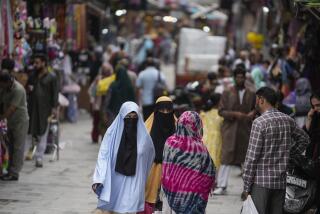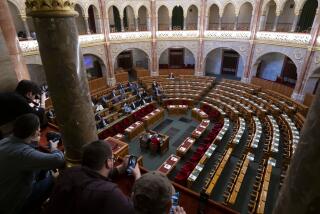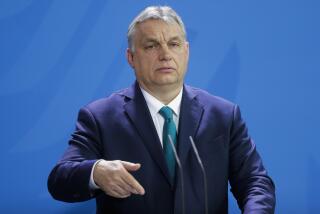Kurdish lawmakers walk out in protest
- Share via
BAGHDAD — Kurdish lawmakers walked out of parliament Tuesday in protest over a vote on conditions for Iraq’s provincial elections that called for ethnic groups to share power in Kirkuk, an oil-rich city that Kurds consider part of their territory.
The walkout, which included shouting and accusations of a conspiracy against Kurds, appeared to reduce the chances that the elections would be held this year. There is no law setting out election procedures.
U.S. and Iraqi officials have hoped that provincial balloting would ease tensions among the country’s main ethnic and religious factions.
Although the measure Tuesday was passed by parliament through a secret ballot, it requires approval by the three-member presidential council, led by Iraqi President Jalal Talabani, a Kurd who is all but certain to reject the legislation.
The contentious issue was among several points that have delayed a vote on legislation to set up the first local elections since January 2005, when most Sunni Arabs and many followers of Shiite Muslim cleric Muqtada Sadr boycotted the vote. U.S. officials believe participation of such groups could go a long way toward righting the balance of power in provincial politics, in which a small number of parties, mainly Kurdish and Shiite Muslim, have dominated.
The elections, sought by U.S. officials for more than a year, have been stalled amid political competition, with parties in the Iraqi government fearing that local elections could cost them influence. Disagreements have centered on the question of whether voters should be allowed to choose individual candidates or pick from closed party lists. Lawmakers have also argued about whether parties could use religious imagery in the campaign and whether parties with links to militias could participate.
The government had aimed for elections in October. But the country’s election commission announced over the weekend that the date was unrealistic and that the legislation must be passed by the end of the month if Iraq wanted to hold the elections by December.
The status of Kirkuk has proved to be a major stumbling block. Last week, the parliament’s Kurdish bloc staged its first walkout over a draft of the electoral legislation because of its provision to either delay provincial elections in Kirkuk until the city’s future is decided or to redistribute power equally among Arabs, Kurds and Turkmens.
The Kurds in parliament had argued that Tamim province, of which Kirkuk is the capital, should be treated no differently than any other region in Iraq. The Kurds swept to victory in 2005 provincial elections in Tamim, largely a result of the decision by Sunni Arabs to skip the vote. The Sunnis, who dominated Iraqi politics under Saddam Hussein’s rule, now regret the decision.
Arabs fear that they would be subjected to discrimination under a Kurdish government in Kirkuk.
On Tuesday, Kurdish legislators said they intended to compromise on the electoral legislation but parliamentary Speaker Mahmoud Mashadani, a member of the parliament’s main Sunni coalition, backed a measure to hold a secret ballot regarding the provision on Kirkuk.
The leader of the Kurdish bloc, Fuad Masoom, led his coalition’s lawmakers out of parliament in anger. Kurdish lawmaker Adil Barwari said Masoom called Mashadani’s move a conspiracy, and others shouted that the vote violated the constitution.
Of the remaining 142 lawmakers, 127 approved the measure. The provision called for a committee to be set up to review the problems in Kirkuk and take interim steps until local elections are scheduled, including apportioning power in the provincial government equally among Kurds, Arabs and Turkmens.
Arab lawmakers defended the push for a secret ballot, saying that parliament members would have been pressured by the Kurds to vote against the provision if it had been a public vote.
“It was feared that there might be pressure exerted on the MPs, so this was chosen in order to give them freedom to express their opinion,” Sunni lawmaker Farhan Awad said.
Before Mashadani backed the call for a secret ballot, Barwari said, the Kurds had worked with their main Shiite partners on a compromise measure to set up their own parliamentary committee to investigate the situation in Kirkuk and delay elections.
The parliament’s deputy speaker, Khalid Attiya, a prominent member of the ruling Shiite coalition, joined the Kurds in criticizing the vote.
“By doing this, we will likely lose the chance to hold elections in 2008,” Attiya told reporters.
Kurdish politicians said the row was almost certain to slow progress on other contentious issues, such as a national oil law, which has stalled in parliament for more than a year.
Barwari said the quarrel could also spill into violence in northern Iraq if the measure approved Tuesday was ratified.
“The measure voted on today is impossible to be implemented peacefully in Kirkuk,” he said.
--
Times staff writers Caesar Ahmed and Usama Redha contributed to this report.
More to Read
Sign up for Essential California
The most important California stories and recommendations in your inbox every morning.
You may occasionally receive promotional content from the Los Angeles Times.










